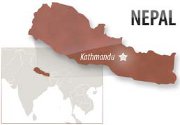By Jawad Mazhar
Special Correspondent for ANS, reporting from Pakistan
KARACHI, PAKISTAN (ANS) -- Two Christian men were seriously injured by young Muslims in Karachi when they refused to convert to Islam, a family member told ANS.
Liaqat Munawar, a resident of Essa Nagri in Karachi, told ANS by telephone that his brother, Ishfaq Munawar, and another young Christian man, Naeem Masih, were returning home after an early morning prayer service at their church in Sohrab Goth on August 14, when ethnic Pakhtoon youths near Sea View harassed and later attacked them.
"Ishfaq and Naeem were riding a motorcycle when six Pakhtoon youths signaled them to stop," Liaqat Munawar said. "They asked the two boys to identify themselves. Ishfaq told them that they were Christians returning from their church after a special prayer service.
"The Pakhtoons then started questioning them about their faith and later tried to force them to recite the Kalma [Islamic conversion creed] and become Muslims, telling them that this was the only way they could live peacefully in the city," Liaqat Munawar said.
"They also offered monetary incentives and 'protection' to Ishfaq and Naeem, but the two refused to renounce Christianity."
After cajoling the two Christians for some time, the Pakhtoons sat in a white car parked nearby and eventually drove away. Ishfaq Munawar and Masih got back onto their motorcycle and were about to start it, Liaqat Munawar said, when suddenly the young Muslims reversed their car and rammed it into the Christians.
"The pathan Muslims got out of the car armed with iron rods and attacked Ishfaq and Naeem, shouting that they should either recite the Kalma or they would be murdered," Liaqat Munawar said.
Munawar said the Pakhtoons severely beat the two Christians, fracturing Ishfaq Munawar's jaw and breaking five teeth, and seriously injuring Masih. He added that the two Christians fell unconscious, and the young Muslim men left assuming they had killed them.
Liaqat Munawar said his brother underwent jaw surgery at Abbasi Shaheed Hospital and is now recovering. He said the family had not registered a case with police, fearing reprisal by the Muslims, but were now considering filing a formal complaint.
Elvis Steven, a Christian human rights defender in Karachi, told ANS that he was in contact with the Munawar family, and that although he had yet to speak with the victims directly, he would attempt all possible means to have the assailants arrested.
"The situation is not that bad for Christians living in areas controlled by the Muttahida Qaumi Movement [MQM], but those living in areas dominated by the Pakhtoons are under constant threat," Steven said.
"The Pakhtoons are extremist in their beliefs. They have a militant mindset, and there have been several incidents of religious violence involving the Pakhtoons (Pathan clan) in Karachi."
This latest incident seems to give evidence beyond any doubt that this was a religiously based attack and the young Christian men were attacked and injured merely because of their faith.
Political bodies involved appear to be trying to score points by claiming that the attacked youths were from their groups and thus triggering a blame game against other political parties.
| Jawad Mazhar is a Pakistani journalist specializing in writing about Christian persecution. He was born on November 28, 1976 at Sargodha's village Chak and raised in Sargodha, a city in Pakistan's Punjab province. He earned his Bachelors Degree from Allama Iqbal Open University majoring in computer sciences and has taught at various educational institutes in his country. He is also involved with "Rays of Development," an organization working for minority rights in Pakistan. He says, "My aim is to help eradicate Christian persecution through my writing as I bring the plight of these brave people under the spotlight of the whole world." |  |
** You may republish this story with proper attribution.





